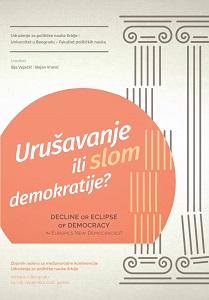Solving problems in Europe’s backyard
Solving problems in Europe’s backyard
Prevent democratic backslide in the Western Balkans or accept the dominance of geopolitical actors with agendas not always compatible with EU’s visions of the region
Author(s): Zhidas Daskalovski
Subject(s): International relations/trade, EU-Accession / EU-DEvelopment, Geopolitics
Published by: Fakultet političkih nauka Univerziteta u Beogradu
Keywords: EU; Western Balkans; enlargement; democratic consolidation
Summary/Abstract: The European Commission praises the accession policy ‘as one of the European Union’s most effective foreign policy instruments’, but four main challenges pose obstacles to the accession of the Western Balkan countries: lack of popular will in EU member states; flagging interest on the side of the EU; bilateral challenges thwarting implementation of regional cooperation; and indifference to the EU from the side of increasingly authoritarian regimes in some Western Balkan countries. Emerging regional powers such as Turkey, or Russia, are ready to step into a vacuum. Without a new impetus towards enlargement, the EU will risk losing strategic influence in a neighbouring region to other regional powers. This article examines how to re-charge the enlargement process, with a focus on an enhanced reform drive by the governments in the region. Elite consensus on democratization is necessitated to stop the democratic backsliding. Active civil society and engaged citizens are needed to aid the strengthening of democracy in Western Balkans. On the other hand, for own interests the EU should induce consensus on democratic consolidation and EU enlargement among parties in the region. The EU should launch a more intensive engagement with the Western Balkans, start the screening process and open accession negotiations with all of the countries as soon as possible, because the accession process is a powerful tool to drive reforms and institutional transformation.
Book: Urušavanje ili slom demokratije
- Page Range: 161-179
- Page Count: 19
- Publication Year: 2016
- Language: English
- Content File-PDF

